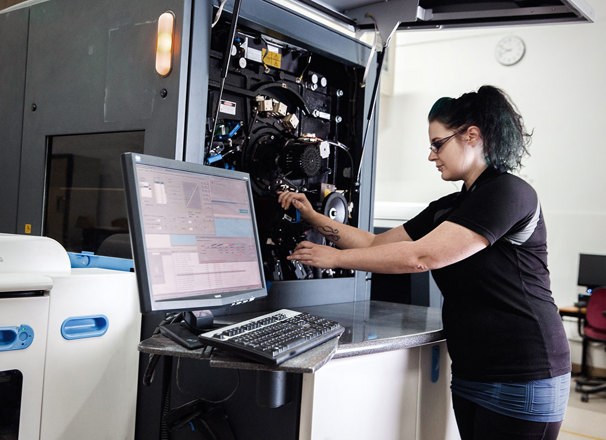When you’re planning your career, grouping companies into industries and industries into sectors can help.
An industry is a group of companies that perform similar activities. A common example in Alberta is the oil and gas industry. A sector is a group of related industries. Alberta’s oil and gas industry, for example, is part of a broader energy sector.
There are many different ways to group industries and sectors. It all depends on the focus. Common examples of sectors include:
- The public sector (government) and private sector (non-government)
- The goods sector (natural resources and manufacturing industries that make physical things) and services sector (personal and knowledge-based industries that deliver services and other non-physical things)
- The 11 sectors used to describe Canada’s stock market—financial, energy, materials, industrial, consumer discretionary, telecommunication services, health care, consumer staples, utilities, information technology, and real estate
Sometimes, industries are grouped into sectors to show trends in a given time and place. For example, InvestAlberta describes 7 key sectors where Alberta companies are doing exciting work right now:
- Agriculture
- Aviation and logistics
- Energy and clean tech
- Financial services
- Petrochemicals
- Technology and innovation
- Tourism
Why think in terms of industries and sectors?
One reason to think about industries and sectors is that related industries tend to rely on similar skills. For example, if you like to work with people, the services sector offers lots of opportunities to do that. If you prefer to work with physical things, the goods sector offers a lot of that type of work.
Another reason is that many industries and sectors are cyclical. Even if your current industry is in decline, another industry that’s growing may need your skills and knowledge. By thinking in terms of industries and sectors, you can make your career more flexible.
Think beyond a single occupation
The future of work is a moving target. Advances in technology are changing the way work gets done, and who—or what—is doing it. The key word here is change.
Self-serve checkouts and online shopping options have already cut back on the need for retail cashiers. The jobs of inventory control and stock clerks are also on the way out thanks to data management software and increasingly affordable robotics.
What do travel agents, commercial fleet dispatchers, librarians, curators, and receptionists all have in common? Many parts of their roles are already being successfully done by everyday computer apps.
Even professional careers like lawyers and accountants face a techno takeover. Artificial intelligence and machine learning make light work of research, rules, and formulas. Consistent, objective, error-free results present a strong—and perhaps irresistible—case for change.
Adaptability has become key to your long-term success. When you think about industries and sectors, rather than individual occupations, you can make your career plan more resilient, allowing you to adapt to labour market changes.
Expand your thinking from occupation to industry sector and multiply your possibilities.
Labour market knowledge can help
Economic and trade activity forecasts in key industries and sectors can point to employment prospects in the province. Labour market trends such as growth predictions for specific industries often make the news. Whether or not those trends will lead to new job openings that you can apply for depends on a number of factors, including:
- Growth rates in the specific industries that interest you
- The size of those industries in your community
- Typical employment turnover rates—the rate of people leaving existing positions—for the types of work that interest you
One example of this is the retail trade industry. Although retail isn’t growing as fast as the finance, insurance, real estate, and leasing industry, it often has more job openings. That’s because retail employs more people. Also, some types of retail work have high employee turnover rates.
You can ask questions and do some research to better understand how labour market trends affect your career and education choices. For instance, what do global trends mean for your local community? Are there exceptions to the trends? Are there ways your community can benefit from the trend?
Where to find industry information
Local industry information can often tell you about:
- Major projects underway within the industry
- The number of people working in the industry and what types of work they do
- Skills and occupations that are in demand
- Names, websites, and contacts at companies that are part of these industries
Here on alis, you can explore various employer job banks, sorted by industry. You can also filter your occupation and job posting searches by industry. When you find occupations that interest you, look for industry details in the “Employment & Advancement” and “Wage & Salary” sections.
You can also visit these other websites to learn more about important industries and sectors in Alberta:
- Industry Profiles
- Alberta’s Key Sectors
- Edmonton Global – Key Sectors
- Edmonton – Economic Sectors
- Calgary Economic Development – Key Sectors
- The City of Red Deer – Key Industries
A simple example: Exploring the goods and services sectors
The goods sector grows, builds, and extracts things
Many types of goods are created in Alberta, including food, fuel and chemicals, pulp and paper, and machinery. Not all of the work is as hands-on as it used to be, however. Advances in technology, data, and communications are expanding the knowledge-based career opportunities in this sector.
Learn more about career opportunities where you produce goods. These goods-sector industries all have occupations, job postings, and industry profiles that you can explore:
- Agriculture occupations, jobs, and industry profile
- Construction occupations, jobs, and industry profile
- Forestry occupations, jobs, and industry profile
- Manufacturing occupations, jobs, and industry profile
- Mining and oil and gas extraction occupations, jobs, and industry profile
- Utilities occupations, jobs, and industry profile
The services sector is about helping people
When you think of service industries, you might think of businesses like hotels, restaurants, and retail stores. These traditional service industries are a big part of the services sector, but they no longer define it. Technological advances are expanding the knowledge-based career opportunities in the services sector as well.
Learn more about career opportunities where you provide services. These service-sector industries all have occupations, job postings, and industry profiles that you can explore:
- Accommodation and food services occupations, jobs, and industry profile
- Educational services occupations, jobs, and industry profile
- Finance, insurance, real estate, and leasing occupations, jobs, and industry profile
- Health care and social assistance occupations, jobs, and industry profile
- Information, culture, and recreation occupations, jobs, and industry profile
- Management, administrative, and support services occupations, jobs, and industry profile
- Professional, scientific, and technical services occupations, jobs, and industry profile
- Public administration occupations, jobs, and industry profile
- Repair, personal, religious, and other services occupations, jobs, and industry profile
- Retail trade occupations, jobs, and industry profile
- Transportation and warehousing occupations, jobs, and industry profile
- Wholesale trade occupations, jobs, and industry profile
If you’re a young person building your career in Alberta, you will likely go through more than a dozen employment transitions in your life. That means more than a dozen new jobs or changes to your existing job over the course of your career.
By exploring whole sectors and industries, you’ll discover a wider range of related jobs and occupations that interest you. For some of them, you may already have all the skills, training, and certifications you need. For others, those qualifications are in reach and may be worth investing in as part of your next transition.




